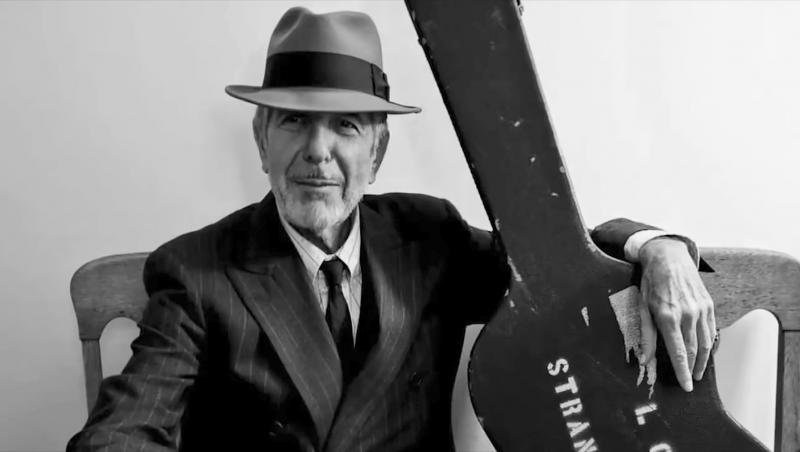Leonard Cohen was deep in his career when he finally finished Hallelujah. Well, the first version of Hallelujah — there would be many, many versions when all was said and done. He’d toiled on the lyrics for seven years. Yet when he submitted the album, Various Positions, to his longtime record company Columbia Records in 1984, the company’s president Walter Yetnikoff decided not to release it in the US. What would become Cohen’s seminal anthem was dead on arrival.
But in the new documentary Hallelujah: Leonard Cohen, A Journey, A Song, in theaters Friday, directors Dayna Goldfine and Dan Gellar examine how despite the odds, the song managed to take on a life of its own thanks, in varying degrees, to Bob Dylan, John Cale, Jeff Buckley and Shrek. Yes, Shrek. Now, four decades after its initial recording, it’s downright ubiquitous, a regular feature in movies, television shows, and singing competitions around the world.
It’s an interestingly stitched together film that starts at the end — his final performance in 2013, singing Hallelujah, of course — and rewinds to the beginning of his songwriting career to trace how he got there. It feels, in some ways, like two different films: The first part is a standard biographical documentary that then shifts focus to Hallelujah’s resurrection outside of Cohen, before finally turning attention back to Cohen and his triumphant final tour. As the title says, it is a journey and a long one at that.

Photo: AP
The filmmakers are enamored of their eloquent subjects, from Judy Collins and composer/arranger John Lissauer to a childhood friend and his rabbi Mordechi Finley. One of the main voices is journalist and author Larry “Ratso” Sloman who interviewed Cohen many times over 30 years and whose tapes of those interviews are used to let Cohen speak for himself. The archival footage, too, is pretty extraordinary and elegantly paired with Cohen’s music throughout.
Much of the film is devoted to chronicling Cohen’s own spiritual journey and his evolving relationship with his Jewish faith, from his poetry to his later years at a zen center atop Mt Baldy. Singer Regina Spektor marvels about his graciousness at his Coachella performance in 2009, saying that it was like Cohen was teaching the audience how to be good.
And yet, for all the talk about and praise for his seeking, this is a film that seems completely uninterested in the fact that he’s the father of two children. We see photos of them as babies with their mother during an offhanded mention that his family was breaking up. A reporter mentions the kids later, but only in context of clarifying that their mother Suzanne Elrod was not in fact the woman he was singing about in Suzanne.

Photo: AP
There could be many reasons for this, including possibly honoring the wishes of his grown children, or wanting to focus on the work. But the absence of any acknowledgement makes this attempt at a deep, holistic portrait of Cohen feel incomplete at best. There is more time devoted to explaining the aesthetics of Shrek than his relationship with his kids.
Or maybe they just weren’t really part of the path to Hallelujah, though his daughter did have a child with Rufus Wainwright, who is responsible for one of the more famous covers of the song, featured on the wildly successful Shrek soundtrack.
A lot of credit for the prolonged life of the song is given to Shrek. Even though movie soundtracks have diminished somewhat in cultural currency, it is hard to underestimate the power of hearing a great song for the first time in a movie.
It is interesting, though, that it seems to have been John Cale’s cover that became the most influential. He stripped down the arrangement, took to the piano, belted out the lyrics and turned Hallelujah into a melodic anthem. Jeff Buckley even said that though Cohen wrote the song, it was Cale’s version that he was covering. No one, it seems, from Brandi Carlile to Bono to Eric Church, is out there singing Cohen’s version.
In one interview, after Hallelujah placed No 1 (The X Factor contestant Alexandra Burke), No 2 (Jeff Buckley) and No 36 (Cohen) in the UK in 2008, Cohen said he thought “People ought to stop singing it for a little while.” Sloman believes he was kidding, but it hardly even matters at this point. The song became bigger than Cohen and seems destined to live on in the culture for years to come.
Hallelujah: Leonard Cohen, A Journey, A Song, a Sony Pictures Classics release in theaters Friday, is rated PG-13 by the Motion Picture Association for “brief strong language and some sexual material.” Running time: 115 minutes.

On Sept. 1, President William Lai (賴清德) said “If it is for the sake of territorial integrity, why doesn’t [China] take back the lands occupied by Russia that were signed over in the treaty of Aigun? Russia is now at its weakest, right?” “You can ask Russia [for the land back] but you don’t. So it’s obvious they don’t want to invade Taiwan for territorial reasons,” he added. Lai was referencing an 1858 treaty under which, along with an 1860 convention, Russia annexed about one million square kilometers of Manchurian Qing territory in Outer Manchuria, including Haishengwei — today known as

This month Taiwan received a brutal Christmas present as the Chinese Nationalist Party (KMT) passed all three of its desired amendments, making recalls of elected officials more difficult, gutting the Constitutional Court and altering the budgetary allocations to local governments. The nation at present has no ultimate authority to determine the constitutionality of government actions, and the local governments, largely controlled by the KMT, have much greater funding. We are staring into an abyss of chaos. The amendments to the Act Governing the Allocation of Government Revenues and Expenditures (財政收支劃分法), if they become law (as of this writing President William Lai

Dec. 30 to Jan. 5 Premiering on Jan. 4, 1956, Xue Pinggui and Wang Baochuan (薛平貴與王寶釧) unexpectedly packed theaters for the next 27 days. Taiwan’s first 35mm Hoklo-language (commonly known as Taiwanese) movie beat out the top Hollywood blockbuster, Land of the Pharaohs, and the Mandarin-language Peach Blossom River (桃花江) in box office sales, kicking off a craze that lasted until around 1970. More than 800 Hoklo-language films were made despite government attempts to promote Mandarin. The Chinese Nationalist Party (KMT) owned the nation’s three major production houses, mostly creating Mandarin films filled with anti-communist messages and patriotic propaganda. But most

Charges have formally been brought in Taiwan People’s Party (TPP) Chairman Ko Wen-je’s (柯文哲) bribery, corruption and embezzling of campaign funds cases. Ko was briefly released on bail by the Taipei District Court on Friday, but the High Court on Sunday reversed the decision. Then, the Taipei District Court on the same day granted him bail again. The ball is in dueling courts. While preparing for a “year ahead” column and reviewing a Formosa poll from last month, it’s clear that the TPP’s demographics are shifting, and there are some indications of where support for the party is heading. YOUNG, MALE